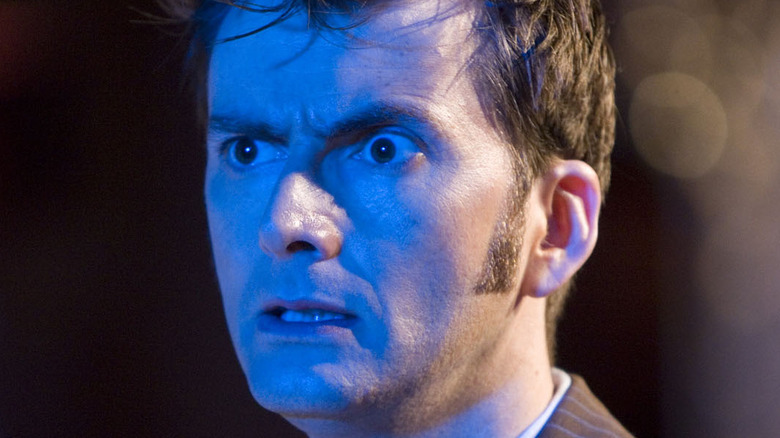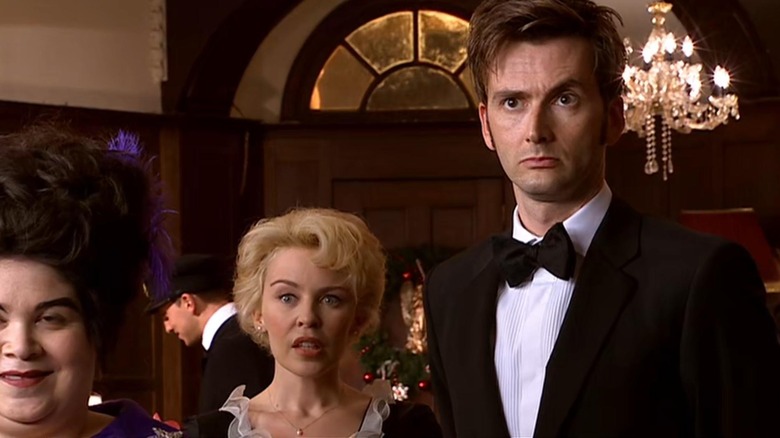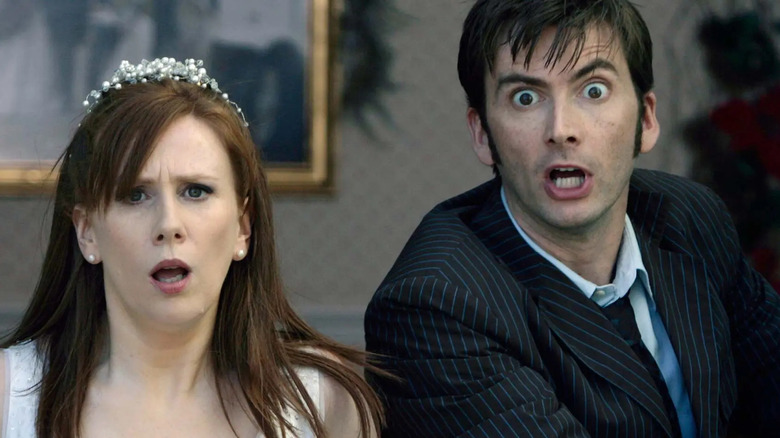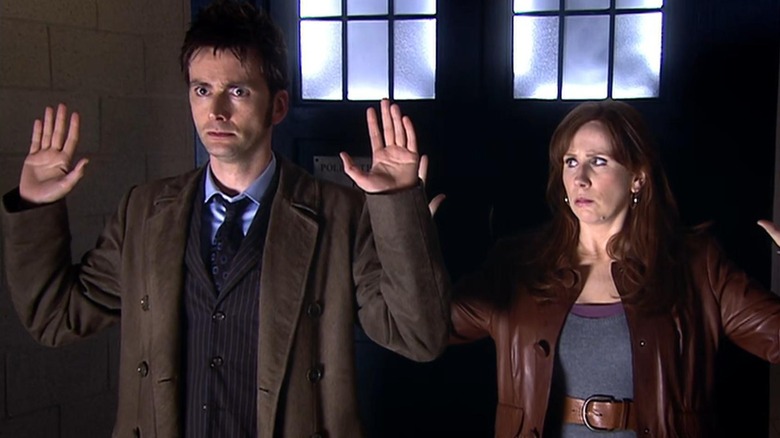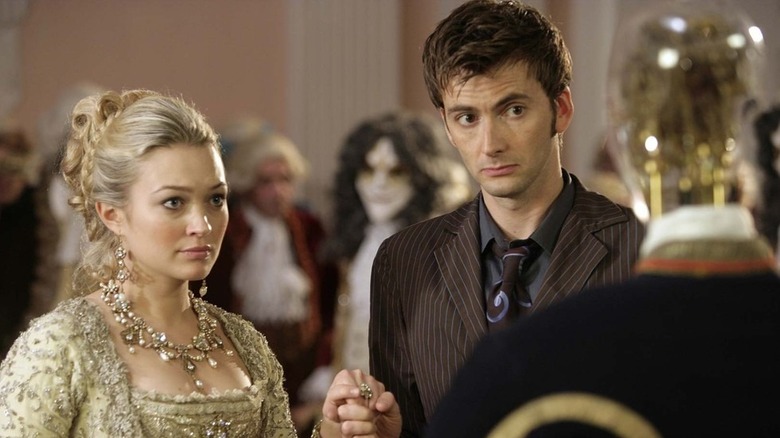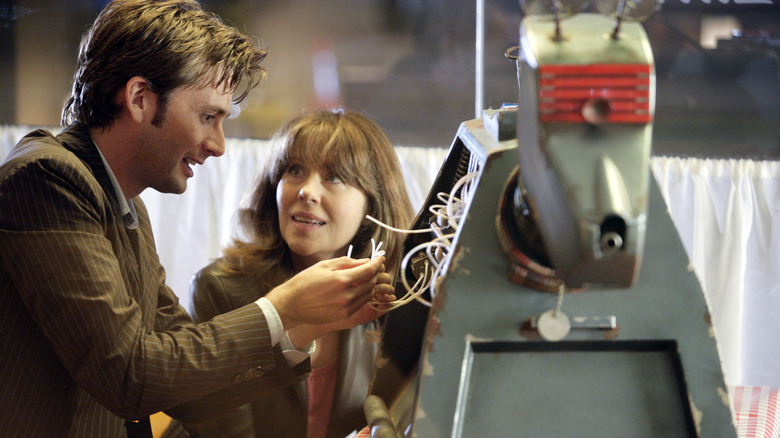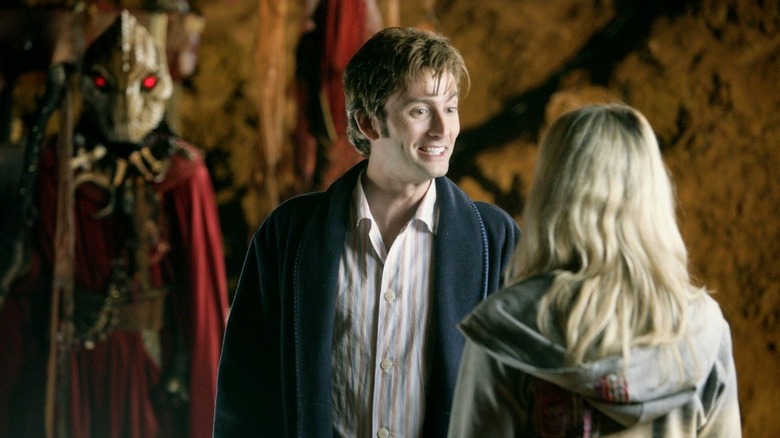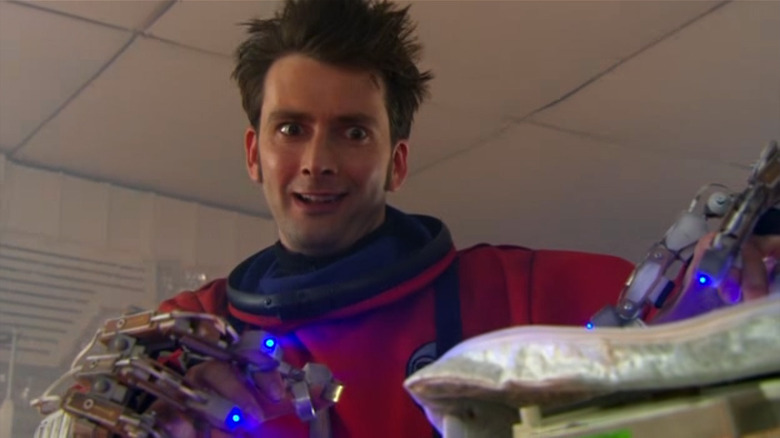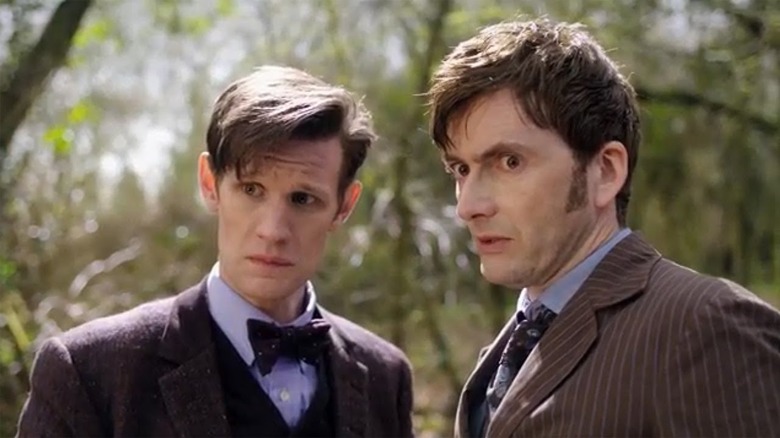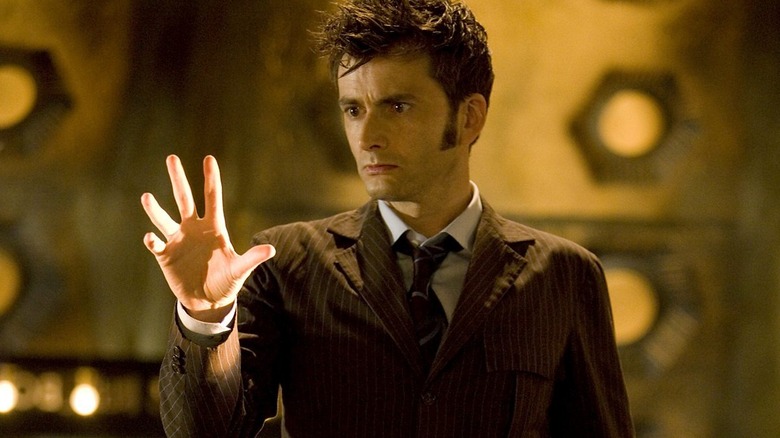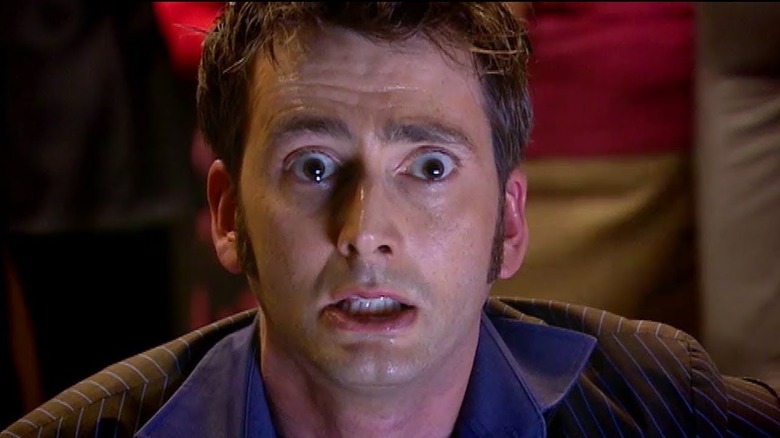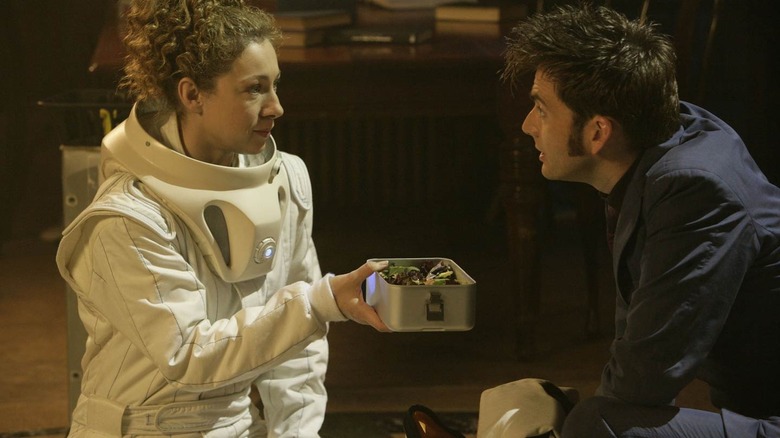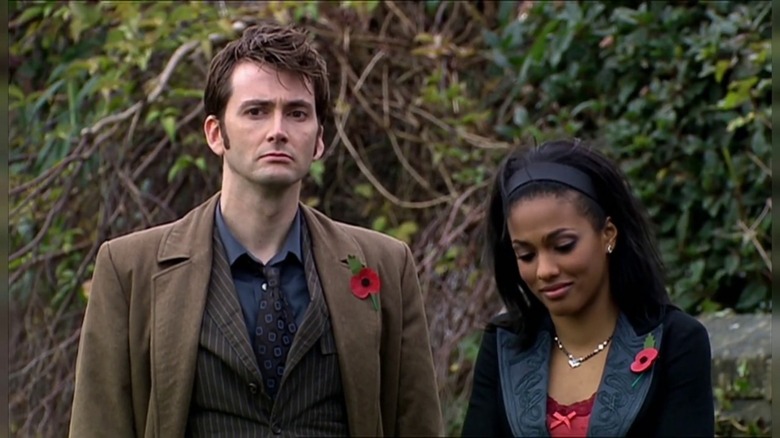David Tennant's 12 Best Episodes Of Doctor Who Ranked
Revived in 2005, "Doctor Who" returned to the BBC with Christopher Eccleston stepping into the big blue box as the Ninth Doctor. Many fans were stunned when word leaked out that the series' newest star would exit the role after his first batch of episodes, and young actor David Tennant was announced as his replacement. But who was Tennant?
A lifelong fan of "Doctor Who," David Tennant had always dreamed of playing The Doctor, but he was as surprised as anyone when he was offered the role. Debuting on Christmas Day in 2005, Tennant became the 10th Doctor and began his legacy as a beloved British icon. Starring as the Doctor for three seasons, Tennant left scores of sad fans behind when he departed on New Year's Day of 2010. But unlike some other stars, Tennant has continued embracing his role as The Doctor over the years, returning for the 50th Anniversary special in 2013 and reprising the role (sort of?) as the 14th Doctor in 2023.
Tennant's returns have been heralded by Whovians around the globe who are thrilled to get more stories from Tennant's take on The Doctor. With his return on the horizon, it's time to look back at his best stories. So reverse the polarity of the neutron flow and adjust the helmic regulator, because we've found a rupture in the time vortex that contains the 12 best David Tennant episodes of "Doctor Who." Allons-y!
12. Voyage of the Damned
Each Doctor's performance and characterization can differ based on their companion and can be decidedly different depending on how they react and interact with the different personalities who accompany them on their adventures. The 10th Doctor has three primary assistants — Rose Tyler, Martha Jones, and Donna Noble — with each providing different dynamics. But in "Voyage of the Damned" he has a one-off sidekick in the form of Astrid — guest star Kylie Minogue — which gives him someone new and unexpected to bounce off of.
"Voyage of the Damned" aired as the 2007 Christmas Special and picks up from the previous season ender that leaves the Doctor traveling alone. It begins with the TARDIS crashing into the starship Titanic, a space-bound replica of the ancient Earth vessel, but like its namesake, this cosmic cruiser is facing its own deadly cataclysm — it's on a collision course with planet Earth. With the help of Astrid, a waitress aboard the ship, The Doctor must contend with a horde of malevolent androids if he's going to save billions of lives.
An underrated holiday special, the episode gives the 10th Doctor a captivating climax that makes for one of his finest heroic speeches. While he's done it many times before and since, his declaration of being the world-saving Doctor is a memorable moment that lets Tennant prove why he's so celebrated.
11. The Runaway Bride
David Tennant had a host of holiday specials during his run, and they are all bangers, especially "The Runaway Bride" which gave Tennant plenty of great material to chew on. It's also the first full appearance of new companion Donna Noble — played by Catherine Tate — which allowed fans to see a new side to the 10th Doctor after Rose Tyler's departure in a tear-jerking season finale earlier that year.
The first meeting between The Doctor and Donna is a mystery of sorts, as Donna is transported aboard the TARDIS against her will to The Doctor's bewilderment. After discovering that she's been unwittingly infected by strange particles that drew her to him, The Doctor realizes that Donna's fiancé Lance is part of the clandestine alien-observing organization known as The Torchwood Institute and his goals are ironically anything but noble.
Establishing Donna as very different from Rose, Tennant and Tate prove just how different their relationship is going to be. With plenty of wild banter and wacky shenanigans, "The Runaway Bride" is a Christmas-themed story that gave audiences a light-hearted change of pace from the somber finale. Tennant showed what perfect comic timing he has, and what instant chemistry he possessed with Tate. Donna doesn't hop aboard the TARDIS full-time until Series 4, but "The Runaway Bride" still sets the stage for her eventual adventures with The Doctor.
10. The Stolen Earth/Journey's End
Even if it's not quite the grand finale of Tennant's 10th Doctor, the two-part story "The Stolen Earth" and "Journey's End" very much feels like a goodbye for his character in some ways. In other ways, the story serves as a cap on the first Russell T. Davies era of "Doctor Who," which began when the showrunner first revived the series in 2005. Though it isn't technically the end of this run for Tennant or Davies, it's the last episode of Series 4 and ties up most of the loose ends for the 10th Doctor.
A story jam-packed with action, adventure, mystery, and suspense, the story moves at a breakneck pace and includes the long-awaited comeback of Dalek master Davros, who hadn't been seen on screen since 1988. With the episode also crossing over with "Doctor Who" spinoffs "The Sarah Jane Adventures" and "Torchwood" and including the surprise return of previous companions Rose Tyler and Martha Jones, the episode truly feels like an epic swan song. The final shot of The Doctor looking longingly into the rain hammers that feeling home.
The cliffhanger at the end of the first half also features one of the biggest surprises ever pulled off by the series, with The Doctor regenerating unexpectedly. The mind-numbing conclusion that led to the creation of a human Doctor duplicate left many jaws on the floor.
9. The Girl in the Fireplace
Throughout the initial 25 years of "Doctor Who," The Doctor is rarely if ever involved in a romance. The revived series in 2005 certainly teases the possibility with Christopher Eccleston's Ninth Doctor and Rose Tyler, but David Tennant's 10th Doctor is basically the first to openly fall in love and acknowledge his romantic feelings. But before he (kind of) expresses his feelings for Rose, he has another true love in the Series 2 episode "The Girl in the Fireplace."
The first 10th Doctor story written by future showrunner Steven Moffat, "The Girl in the Fireplace" is a timey-wimey love story inspired by "The Time Traveler's Wife" which, appropriately enough, the writer wound up adapting for TV in 2022. In this installment, The Doctor goes aboard a derelict spacecraft in the 51st century where he discovers strange portals that lead to various points in time in the life of Madame de Pompadour, the young lover of King Louis XV. To save her from a deadly threat, The Doctor visits her through the portals, arriving at different periods in her lifetime.
But what makes the episode so special is the impeccable chemistry between David Tennant and guest star Sophia Myles as Madame de Pompadour. Their tender relationship through time is poignant and powerful, and the final moment when he pays her one last visit is one of the most heartbreaking scenes in Tennant's tenure.
8. School Reunion
Being immortal, The Doctor has the unique ability to revisit decades-old stories even if they starred other, older actors in the same role. But in a 2006 episode from the sophomore year of the newly revived series, fans got an altogether unexpected treat with the return of 1970s "Doctor Who" companion Sarah Jane Smith. Original actress Elisabeth Sladen reprised her role as the companion who adventures with Tom Baker's Fourth Doctor in an emotional reunion between two old friends.
The story sees The Doctor, Rose, and Mickey Smith (no relation) investigating some strange goings-on at a high school that turn out to be the work of a race of alien conquerors. While gathering evidence, The Doctor and his assistants get help from an unlikely source in the form of his old companion Sarah Jane, who has since become an investigative reporter. It's an affecting story for The Doctor, who after getting over the initial excitement of seeing his former friend, must confront for the first time the impact his presence has on the companions he inevitably leaves behind.
This theme of abandonment felt by The Doctor's assistants has since been touched on more than once, including in the final episode of Jodie Whittaker's 13th Doctor. But "School Reunion" is where it's explored for the first time, with Tennant giving a stirring performance as The Doctor must examine how his adventures affect those closest to him.
7. The Christmas Invasion
When David Tennant was first announced to take over the role of The Doctor from Christopher Eccleston, the new "Doctor Who" had only just recently premiered. Tennant's first episode wouldn't be the first episode of the second series, however — instead, it's the show's first holiday special that aired on Christmas Day in 2005. But though Eccleston and his Ninth Doctor were gone, most everything else stayed the same, with companions Rose and Mickey sticking around to provide a sense of continuity.
In his debut installment, Tennant acquits himself nicely with an impressive turn as the fresh, newly minted 10th Doctor who is confused but alert, still recovering from his regeneration. Tennant's performance lets us know right away that this Doctor will be more playful, more exuberant, and a little more in touch with his feelings. But the episode also doesn't let us forget that the show will still be full of spills, chills, and plenty of bizarre villains, with the Doctor going up against insidious aliens, deadly robotic Santas, and living Christmas trees.
Tennant is more than just a light-hearted, wide-eyed Doctor, and shows off his sinister side at times, too. To this day, more than any other Doctor, Tennant's first appearance might be the most impressive — he already seemed like he's been in the role for years.
6. The Waters of Mars
When "Doctor Who" came back to television in 2005, showrunner Russell T. Davies made it clear this would be a different kind of "Who." Part of that meant embracing scary stories more than ever. In one of the series' most terrifying installments, "The Waters of Mars," star David Tennant gets to play the lead in a 62-minute zombie movie of sorts. The story also sees the 10th Doctor in a different position than he's used to — here, he is not the confident, self-assured hero he usually is, giving Tennant something fresh to work with.
The third of five consecutive specials that closed out Tennant's run on "Doctor Who," the episode is a nightmarish tale set aboard a remote research station on the Red Planet in the latter half of the 21st century. But this is no ordinary mission to Mars — as the Doctor explains, it's a "fixed point" in time that cannot be changed. According to history known to The Doctor, the early space explorers he meets are doomed to die at the hands of a deadly plague that turns them into ravenous, mindless monsters. Already in torment over his acts of destruction during the Time War, The Doctor faces his own internal dilemma over whether he should attempt to alter events and save their lives. In this horrific monster movie that stands as one of the series' scariest installments, a towering Tennant gives a nuanced take on a self-doubting Doctor.
5. The Day of the Doctor
When David Tennant first debuted as the 10th Doctor in the final moments of the Series 1 finale, he quickly became a beloved favorite, and Whovians everywhere were distraught when he exited the series at the beginning of 2010. Tennant, however, always seemed open to a return in the future, and fans would get just that when he teamed up with his successor Matt Smith and the legendary John Hurt for the 50th Anniversary mini-movie "The Day of the Doctor."
The culmination of six years of stories, the special event episode brings Tennant back to the role that made him an international star. Here, he comes face to face with two other versions of himself — one from the future and one from the past. Together with the 11th Doctor, Tennant's 10th must decide if the War Doctor should use a devastating weapon to wipe out the Time Lords and prevent a universal apocalypse. Should they repeat their past or is there another way?
An eye-popping event that features Tennent back and better than ever, stepping back into the role like he never left, with all the same effortless charm he had when he was leading the series. Tennant — who's demonstrated an ability to conjure incredible onscreen chemistry with everybody from Krysten Ritter to Olivia Colman to Michael Sheen — was predictably dazzling next to Smith, Hurt, and Jenna Coleman as the then-current Doctor's companion Clara Oswald.
4. The End of Time
While "The Day of The Doctor" finally resolves the long-running story of The Doctor's role in ending the dreaded Time War, "The End of Time" is a major part of the journey. It's also David Tennant's final episode of this particular era and sees him regenerate into Matt Smith's 11th Doctor. A two-part extravaganza, Part One aired as the Christmas Special for 2009, with Part Two concluding the story a week later on New Year's Day, opening up a new series of stories for the dawning decade.
An awe-inspiring, over-the-top adventure, we visit The Doctor's home planet of Gallifrey, which has been trapped in a dimensional pocket outside of time. But the Time Lord Council, who has always had a tenuous relationship with The Doctor, now outright fears him. Terrified that he may use a devastating weapon to destroy their world, the Time Lords team up with his arch nemesis The Master in an effort to stop him. Pitted against a billion duplicates of The Master, played by John Simm this time, the 10th Doctor must face down his biggest threat yet and, since this is his final episode, we know he won't survive it.
"The End of Time" also caps off Tennant's first run with an emotional epilogue that sees The Doctor revisit a number of old friends to say goodbye. In a heart-rending sign-off to the audience, Tennant's final line "I don't want to go" won't leave a dry eye in the house.
3. Midnight
An unconventional episode of "Doctor Who," the Series 4 installment "Midnight" doesn't take the TARDIS and The Doctor to the far reaches of time and space and back again. Instead, it's a bottle episode with The Doctor and a group of unwitting innocent bystanders trapped in a confined space from beginning to end. A tension-riddled affair full of ratcheting suspense and sheer terror, The Doctor is without a companion and forced to deal with a problem on his own.
Looking for a cosmic vacation spot, The Doctor pays a visit to a crystalline planet called Midnight where radiation bathes the atmosphere. But while aboard a shuttle bus that's taking him and a group of fellow tourists to see the famous Sapphire Waterfall, The Doctor comes under attack from a strange and deadly creature. The beast, whatever it is, is possessing the bodies of the shuttle passengers, but its intentions are anything but clear. Gripped with fear, they one by one succumb to their own paranoia, but The Doctor begins to believe that the creature's motives may not be to kill them at all.
Without his faithful companion, "Midnight" puts The Doctor into a kind of one-man, one-act play where he must keep a group of squabbling strangers alive. As a result, it's the rare episode where David Tennant carries the episode almost entirely on his shoulders, but he shines brighter than ever in doing so.
2. Silence in the Library/Forest of the Dead
An iconic two-parter that introduces one of the series' most important recurring characters, "Silence in the Library" and "Forest of the Dead" are also among the most terrifying episodes of "Doctor Who" as well. In this installment, The Doctor finds himself in the unusual position of not being the smartest or snarkiest person in the room, which gives David Tennant some delightful moments as he contends with a rival who is as good or better than he is in nearly every respect.
"Silence in the Library" introduces the enigmatic River Song, a cosmic archeologist and old friend of The Doctor who calls on him for help in a critical mission on a far-off planet. But when The Doctor arrives, it turns out that he has no idea who she is, as they're time travelers going in opposite directions. While she's been through quite a bit with The Doctor by this point in her life, it's their first meeting as far as he's concerned.
Together, River and The Doctor must figure out what happened to the missing population of the planet and contend with a vicious race called the Vashta Nerada, who are literally darkness with a fatal touch. But it's the story's second part that gives audience's one of Tennant's finest moments — not only does he save the day, but he's forced to watch as the woman he will one day love sacrifices her life to save him.
1. Human Nature/Family of Blood
The best episode of David Tennant's run as the 10th Doctor is probably Series 3's "Blink," which introduces the Weeping Angels to The Doctor's rogues' gallery. While the Weeping Angels became the most recognizable "Doctor Who" villains to first appear during the show's modern era, we don't see The Doctor interact with them much in their premiere outing. Sally Sparrow, played by Carey Mulligan during her pre-movie star days, does the bulk of the heavy lifting while The Doctor and Martha are stuck in the late 1960s without a TARDIS. "Blink" is an all-time classic "Doctor Who" episode, but it's not really a great David Tennant episode — he's not in most of it.
On the other hand, no story in "Doctor Who" showcases Tennant's talent more than the prior Series 3 installments — "Human Nature" and "The Family of Blood." While Tennant always sparkles as the jubilant but sobering, pensive but carefree hero, here he gets to play an entirely different character in addition, which allows him to show off his range.
Hunted by an alien collective known as the Family of Blood for his life-extending energy, The Doctor hides himself in the past. Arriving in England in 1913, he takes on the role of a schoolteacher named John Smith and removes his entire identity from his mind, storing his own lifeforce within an old timepiece, to be restored by Martha once he's eluded his pursuers.
As Smith, Tennant is thoughtful and caring, a curious man with a thirst for knowledge and a love for his students. When he returns as The Doctor, he is a man reborn anew, having experienced an entirely different life as John Smith. Cold and calculating and full of fury, his experiences in his Earthly guise have changed him forever, and Tennant delivers it with aplomb.
